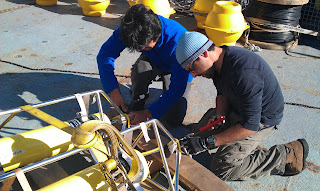Day 3: Question of the day
How many hours of sleep do you get? How much free time do you have? -Vanessa Aguilar
- The past couple of nights i have had great sleep, I have gotten between 7-9 hours per night. The amount you get all depends on what time you go to bed, last night I stayed up talking to the two chief scientist ( Ruth Musgrave and Amy Waterhouse). I was asking them about what we are studying and obtained a lot of information on internal waves, the differences in tides (Barotropic / Baroclinic)*, and mixing that occurs within the ocean. So i went to bed around 2330 (11:30 pm) showered and was asleep by 2400 (12 pm midnight) I woke up at 0700 for breakfast and got about 7 full hours of sleep.
-Within the next couple of days we (the scientist and volunteers) will be starting our shifts (watches) and my shift is from 2000 - 0400 so from 8:30 pm to 4 am (coffee will definitely be my friend) and I will sleep through the morning.
-As of now any time could really be considered free time but myself and the other volunteers are working on deck as much as possible taking advantage of the beautiful weather and obtaining new skills. I believe when my watch starts i will have all afternoon every day to relax, enjoy and work on homework.
Todays accomplishments- 11/12/12
Today was more or less another prep day as we are still on route to our destination, however today we partially assembled the mooring lines. By organizing glass ball flotation devices, prepping the cable, testing ADCPs (A-acoustic D-doppler C-current P-profiler) and also attaching temperature sensors to a select group of flotation devices that will be submerged at various depths.
- After dinner we had another meeting where scientist Paul Chua described tomorrows mooring launch
Tides- Ruth Musgrave*
Barotropic: Lunar and solar powered- have no variation with depth
I
V
Baroclinic: Topography and wind powered - have variation with depth
*Barotropic tides cause Baroclinic tides*
Barotropic tides are the tides that go in and out they are caused by the gravitational pull of the moon and sun. Barotropic tides cause baroclinic tides with help from sub surface topography and wind.
Barotropic tides are the tides that go in and out they are caused by the gravitational pull of the moon and sun. Barotropic tides cause baroclinic tides with help from sub surface topography and wind.
Amy Waterhouse and Jen Mackinnon double checking acoustic releases for tomorrows mooring drop
Temperature sensors organized for all 3 moorings
Chief scientist Ruth Musgrave (left) and Hanne Beate (left) reviewing data
Julie Alvarez spooling the mooring cable with help from Paul Chua
Hanne Beate and Alfredo Wezel prepping a Long range ADCP in a mooring cage
Felipe Gomez and Michael Fuentes prepping a set of ADCPs
glass ball flotation devices wrapped in plastic "hard hat" protection
Discussing and plotting ideal spots for each mooring
Map of Mendocino Ridge
Chief Scientist Ruth Musgrave reviewing the drop zone for a mooring in Eel Canyon
Paul Chua discussing tomorrows mooring deployment











look like its good weather
ReplyDelete